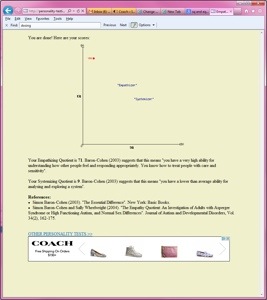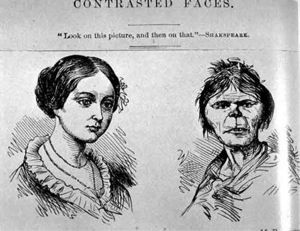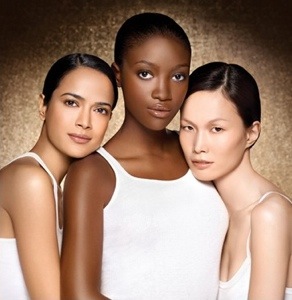Okay, never one to shy from controversy, I think I had my first real experience being “stealth*.” To be fair, I’ve gone to the store many times, and I’m more or less stealth – outside that time I went late at night, about which I blogged previously, I’ve actually rarely felt very stared at, and most of the time I make direct contact with a few people in the process, and none of them do a double take, and the interactions are pleasant, except when someone honks at me, because I swear I looked in the rearview and they were not there when I started backing out.
It’s often worse at inclusive spaces**, in a slightly ridiculous way, because other LGBT people read me more readily than straight people. Also, more generally, the funny consequence of this is that only people who know me well ever misgender me, even though I’m just three months on hormones. You can argue the point if you want (people got catty when I suggested this was happening in a trans thread on Facebook). But it’s decently accurate, and no one is more surprised about it than I am.

I just met you, and this is crazy, but here’s my number, so call me Blackbird?
But, in the real, not officially inclusive world, the experiences have been stacking up. I do get compliments. They’re flattering, but I also admit that when I get compliments, going out, I assume people know exactly what I am, and they think I’m hideous, and they’re just being nice (because who could ever find me pretty?). So they compliment my bracelet or earrings to be pleasant without having to engage me on my appearance. This interacts a bit with the eating disorder history, too. I don’t have distorted body image so much, anymore, but at some level, those perceptions and those cognitions will always be with me.
Anyway, little things challenge the pattern of cognition. I sat down at Starbucks the other day, and the woman on one side chatted friendly that she was envious that I could pull of a pant suit, because she can’t. This one I don’t think really had anything to do with recognizing I was transgender, but moreover, it caught me off guard, because I was a little scared to go with the pants over the skirt for fear that the outfit was just a little less clearly feminine, although, of course, with a frilly blouse, heels, and dangly earrings, the point comes across, honestly, well enough. But anyways, I was caught off guard, although the compliment felt genuine and really nice, actually. I quickly recovered with, “Thank you! I’m not always sure I can, either!” Which is actually the truth. My face doesn’t blush unless NARS has helped, but I would have blushed if my complexion allowed for it. The young women on the other side of me liked my earrings. Excellent power up before going into a big meeting, and I felt just plain like a woman all day***.
But here’s the other, secret part. This is the part I haven’t heard very many trans people who “pass” (either as well as I do, or far better) talk about. Conceptually, I think it’s unlikely no one recognizes I’m, well, a different kind of woman. I also kind of know it’s unlikely that everyone thinks I look like a freak, and they are all simultaneously playing much better poker faces than I can muster, so that no one in the crowd shows it. I can also conceptually accept that some people probably do think I look a little … different … and may not much care for it, and are just being nice. What drives me crazy is not whether I pass, but that I don’t know what other people think of me. That drives me insane, because I’m that girl who wants everyone to like her, and can’t be terribly comfortable with the idea that there may be people who are faking liking me and I don’t know it. There. I said it.
People have written about how it’s hard to be pretty. I’m not going to try to convince you of some absurdity, like pretty people have it worse than ugly people or smart people have it worse than stupid people, or rich people have it worse than poor people, because by and large, the scientific evidence (which has addressed this) does not support the claim. But this is the dark side to … passing is the wrong word. Stealth is the wrong word, because, as I’ve already explained, I’ve made a nuanced decision not to go stealth, even if I could. It’s the dark side to having a high degree of social acceptability (in a wide range of settings and among people who don’t know me) as a transitioning person, because like pretty people (dare I say other pretty people? It’s taken me a long time to wrap my head around the fact that I’m perceived as pretty, as much as I’ve longed for the moniker all my life), a lot of us hide insecurities, and just … there is a specific hell to not knowing what people think of me, even if the answer would turn out to be not so bad.
* Here I simply mean being in a cisgender space and being pretty sure most of the people with whom one interacts don’t know one is trans. As usual, I semi-facetiously court controversy. So, I don’t pass judgment on the choice of trans people who choose to go into a deep stealth, where they live in such a way that even many/most of their close/intimate friends and colleagues do not know they are trans. As I’ve said before, locally, that could never be an option for me, but were I to relocate somewhere where there isn’t a large neuropsychology presence or other network connections to my perceived-male days, it might be feasible. I don’t have the option globally, unless I were to leave my profession. I’ve also chosen not to do this, because, in my case, I believe I can work and thrive here, where many people know me, and by doing so open the door wider for our siblings.
** Okay, so I wrote my post about Coolclusion, right? A couple weeks later, at church, one of the same people I mentioned, I kid you not, on the day that the sermon was about what it means to be an open and affirming church, told my girlfriend and me, “If we can accept you [laughter], we can accept anyone, can’t we?” Blithely. What does it really say about us, as a people, if I can go to expensive bars and fancy restaurants, and totally get treated well and feel welcome, and this is the standard to which we hold ourselves in making an inclusive church accepting? How did things come to be this way, and how do we right the apple cart?
*** And they don’t even know what coolclusion is, or who they’re trying to coolclude!














